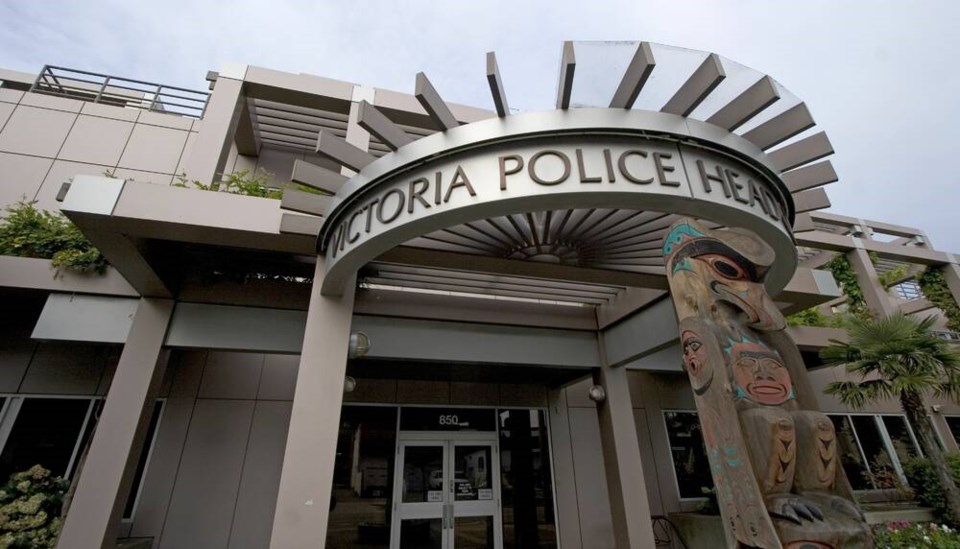Esquimalt council’s decision not to renew the 10-year Police Framework Agreement that governs policing in Victoria and Esquimalt could be a step toward a more regional approach to policing, Victoria’s police chief said Tuesday.
Del Manak said Esquimalt needs provincial approval before it can split from the agreement, which means there’s a chance Public Safety Minister Mike Farnworth could use the process to make bigger changes.
“This is where I hold out hope as an optimist,” said Manak. “Government right now is sitting on a report from the special committee on reforming the Police Act and one of the recommendations is a regional approach to policing.
“So maybe this allows government to move forward on one of the recommendations. Perhaps this might be an opportunity to make major structural changes in the makeup of the police departments here in the south Island.”
Esquimalt Mayor Barb Desjardins certainly hopes there is some kind of change.
“[Esquimalt and Victoria] have been the only two communities in this kind of situation and clearly this has not worked well, so something has to give, something has to change,” she said.
“We feel we can’t continue with the situation as status quo with costs going up and with the inability to make decisions for policing for our community. So we are moving forward on this process to get options we can put in front of the province.”
The agreement, which has been contentious ever since the province forced the merger of the two municipalities’ departments in 2002, is up for renewal this year for another 10-year term.
Desjardins said the agreement has been challenging for both municipalities, which are making decisions on one budget despite having vastly different needs.
“This issue represents a significant amount of Esquimalt taxpayers’ money that could be used on a variety of projects of benefit to the community,” she said. “Given that we are at the end of the current agreement, it would be irresponsible to not do our due diligence in considering all our police servicing options.”
That could include a regional approach, which Desjardins said would be fine by her.
“Victoria and Esquimalt have been the strongest proponents for regional policing,” she said. “We continue to be that and so if it went forward toward regional policing, that is certainly something that we would be very pleased with.”
Esquimalt staff will put out a request for proposals today Aug. 17 to identify a consultant to suggest one or more police service models. Esquimalt has requested $150,000 from the province for the process.
The township believes a new model can be chosen and provided to the province for approval before the existing agreement expires on Dec. 31, 2023.
The relationship between Esquimalt, Victoria and the police department they share has been difficult since the merger. It was supposed to be the first step toward creation of a regional police force, but that plan stalled in the face of opposition from many municipalities.
Esquimalt tried to break away from the forced marriage a decade ago, but was rebuffed by the province.
The province has made it clear it is open to a new approaches.
In a statement, Public Safety Minister Mike Farnworth said he will wait to see what Esquimalt’s consultative process comes up with.
“Last summer, I told the mayors of Victoria and Esquimalt that I was prepared to consider their municipalities’ proposals for policing and law enforcement by separate independent municipal police departments in their respective communities.
“To receive approval for a transition, the Township of Esquimalt must provide a detailed plan outlining the new proposed policing model as well as its transition plan. The ministry will then determine if the proposed plan will provide an adequate and effective level of policing and law enforcement to the community.”
The most recent rift between Victoria and Esquimalt saw the Victoria Esquimalt Police Board request the province to determine how to resolve a $1-million dispute over the cost of 10 new Victoria police jobs.
That came in March after Esquimalt council rejected a request from Victoria police that it fund its share of the cost of the jobs.
While Esquimalt approved the core police budget, it did not approve funding for 10 new personnel — four civilian positions and two officers for the Assertive Community Treatment team, two officers who would be part of a co-responder team with Island Health, a cultural liaison officer to build bridges with the Indigenous, Black and people of colour communities, and a sergeant to work on cybercrime.
Victoria council approved both the core budget and its share of the $1-million for the new positions.
Esquimalt covers about 14 per cent of the police budget, or just over $8 million, with Victoria paying the rest.
This year, the Victoria Police Department requested a budget of $63.4 million, up from $59.2 million in 2021.
Manak said he wasn’t surprised at Esquimalt’s move, as the council has expressed concern over its share of the cost of policing for years.
He was disappointed, however, that his officers get caught in the middle.
“It just impacts our officers so deeply because our officers live in Esquimalt, they love providing service to Esquimalt residents and we’re at all their community events,” he said.
“This is about funding and money. I don’t want the officers to feel that they’re devalued and that the work that they do and the commitment that they have to serving Esquimalt residents isn’t appreciated by the township because that’s just not the case.”
In a statement, the City of Victoria’s head of engagement Bill Eisenhauer said Victoria has always supported a regional amalgamated police force.
“Now that Esquimalt has given formal notice to not extend the framework agreement, the city will consider next steps in discussion with Esquimalt, the police board and the province,” he said.



